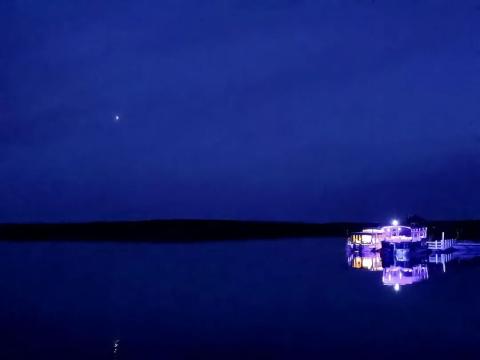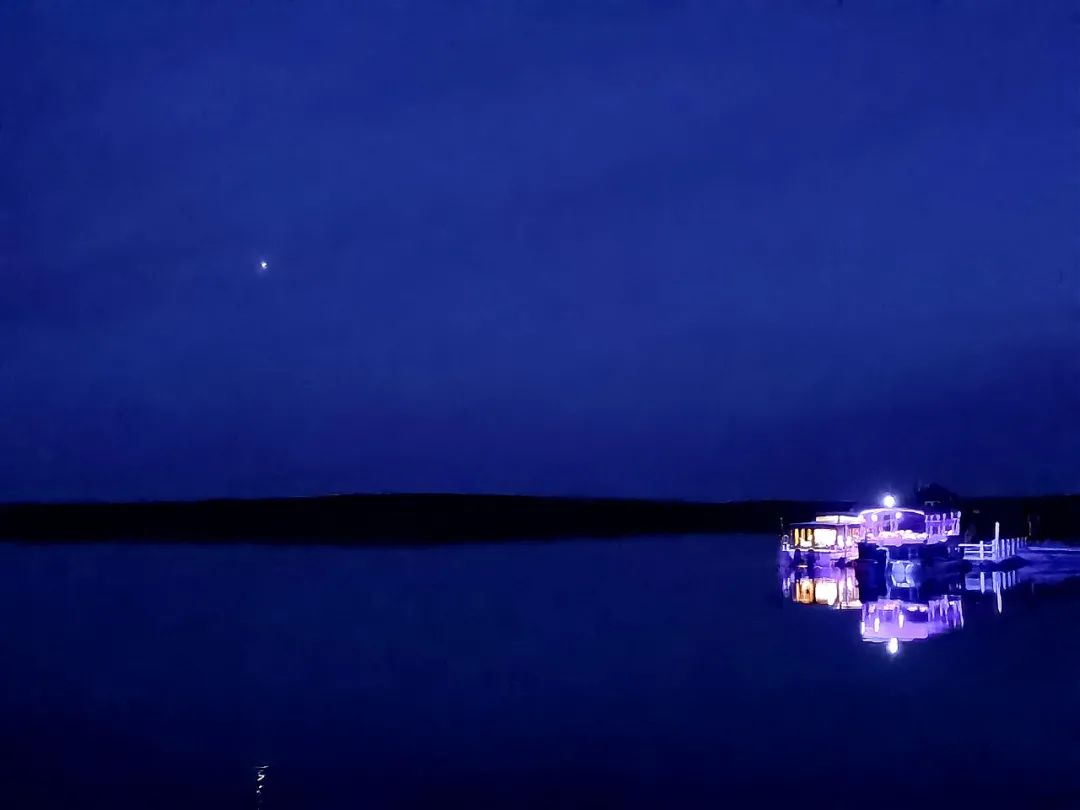
10 month13 day
Sunrise at Juyanhai
At 5 in the morning 30, we took a bus to Juyanhai to watch the sunrise.
It was still dark outside the car window when we left the city. Nothing could be seen on both sides of the highway. Only the long lights on the highway cut through the pre-dawn night.
There are countless tourist vehicles, all heading in the same direction and towards the same destination - Juyanhai.
Juyanhai is the tail lake of the Heihe River (ancient weak water), the second largest inland river in China. The water source of the Heihe River flows from the Qilian Mountains through a process of more than 800 kilometers. After flowing to Ejina, it flows into the two lakes on the northwest edge of the Badain Jaran Desert. Two large lakes were formed in the Gobi depression. They were called Xiyanze in the Han Dynasty, Xihai in the Wei and Jin Dynasties, and Juyanhai in the Tang Dynasty. About 40 kilometers away from Dalaihubu Town, Ejina Banner, between the north side of the Badain Jaran Desert and the 800-mile Gobi no-man's land to the west, Juyan Lake forms a unique landscape in the desert.
The name "Juyan" was first seen in the reign of Emperor Wu of the Han Dynasty (156 BC - 87 BC). The word "Juyan" is a Xiongnu language, and "Shui Jing Zhu" explains that it means "weak water flow and sand". Juyan area Its geographical location makes it a must-stop place for the "Silk Road" of the Hexi Corridor to reach Mobei. It is a blending zone for communicating farming and animal husbandry cultures, and it is also a must-stop place for the "Towering Khan" of the northern grassland people. Due to its important geographical location, the Juyan area has been a must-defend place for military strategists throughout the ages. It is also an open, inclusive and culturally diverse place.
The bus arrived at Juyanhai. The weather was so cold. I couldn't help but shiver when I got off the bus. I saw that there were so many tourists. Everyone came to watch the sunrise.
Entering the scenic spot, some tourists rush to the station, and more go to the trestle on the left side of the gate. The staff at the scenic spot said that if you want to watch the sunrise, the trestle is the best place.
Before getting off the bus, the driver and tour guide Xiao Peng told us that we would take the bus after taking pictures of the sunrise, and we would go to the next scenic spot in the afternoon.
We followed the crowd towards the trestle. The bridge was already full of people, and the sky in the east began to turn white. I had to walk in quickly, find a place with few people to stop, and wait for the sun to rise.
In Juyanhai in October, the temperature was already very low, and my hands became a little stiff after a while.
Despite the cold weather, excitement among visitors was high. After traveling dozens of kilometers, I got up in the middle of the night just to watch the sunrise.
Except for the lights, the lake was still dark. To the side, in the lake not far away, is probably a yacht dock, with bright lights, which looks very bright in the night sky, bringing a little warmth.


In the east, where the sky and the earth meet, there are gradually colors, pink, crimson, and gold. The sky gradually becomes brighter, and the lake gradually becomes brighter, reflected red by the rays of the sun. The reeds sway in the wind, gradually becoming clearer, and the silver-white reed flowers shine. Glowing with light.




A few sand gulls flew over, playing on the lake a little further away, and then slowly approached the trestle, not afraid of people at all. Some tourists scattered some biscuits on the lake, and a few gulls came to fight for them. Seeing this scene, some tourists said regretfully that they had forgotten to bring some bread to feed the gulls.





I have seen the sunrise on Dianchi Lake, the sunrise on the sea, and the sunrise in the mountains. The sunrise on this desert lake is even more exciting. Here, the sky and the earth are so vast, you can see far and wide, all the way to the intersection of the horizon and the sky. We squeezed into the crowd, took a good seat, and quietly waited for the glorious moment of heaven and earth.
The golden patch on the horizon became wider and wider, and after a while, a golden, somewhat dazzling bright spot appeared not very high from the horizon. The clouds were thick, and someone looked at the time and said the sun had risen.
Yes, the sun has risen, shyly hiding behind the colorful
Behind the clouds, a veil was secretly lifted, half-hidden, and it looked like a big golden highlight.


The clouds are thick today, and we can't see the red sun bursting out and jumping over the horizon. It's a bit regretful, but it also seems satisfying. Although we cannot see the spectacular and glorious scene when the sun rises, we can also see the nurturing time before the sun rises.
On the shore of the lake and on the trestle, many people were reluctant to leave for a long time, as if they were unwilling to see the rising sun. They stood in the cold wind and looked at the east, as if they were waiting to see the sun show its bright smile.
It seems that the clouds will not disperse for a while. We still had to hurry, so we had no choice but to wait.
The Juyan Lake in the long yellow sand has historically had abundant water. The lakeside is a beautiful grassland with fertile land and lush water plants. It is an oasis in the desert, as dazzling as a pearl. Later, due to the decrease in inflow of water, Juyan Sea once stopped flowing and dried up several times. In order to save this desert pearl that is about to disappear, at the beginning of this century, the country unified the allocation of Heihe water, increased ecological management, and successfully divided water across provinces, allowing Juyan Sea to re-inject Heihe water, and the ecology was gradually restored.

The ancient Juyan Sea, a clear water oasis, its former fertility and the importance of frontier passages have left a large number of historical and cultural relics. If you have time, I really want to go to the Juyan ruins to explore the secrets of history.
This is a place with a beautiful legend. It is said that when I rode a green ox, I left Hangu Pass in the west and arrived at Juyanhai. I saw the beautiful and strange scenery here and transformed into an immortal here. The heroic feat of the Torhut people returning eastward created the world-famous miracle of the Great Migration and added a significant page to the history of the Juyan region. Li Bai, Du Fu and other great poets of the Tang Dynasty wrote many magnificent and desolate poems about the frontier fortress, but Wang Wei was probably the only one who actually visited the Juyan area of the frontier fortress.
In addition to the famous "Emissary to the Fortress", Wang Wei also wrote "Out of the Fortress" written on the envoy's fortress: "Outside the city of Juyan, I am hunting for geniuses, and the white grass is burning all over the sky. Muyun. When the Qi is empty, the plains are good for shooting eagles, and the generals of the Qiang army are crossing the Liao River at night.
Juyan's experience makes Wang Wei's frontier fortress poems more real and interesting.
Juyan has a rich history and culture, and there are many stories and legends here. The restored Juyan Sea has infinite scenery, but there is no time to inspect and appreciate it. With a few photos of the amazing sunrise and the magnificent scenery of the morning glow, I got on the bus with a little bit of satisfaction. Let the mystery of Juyan culture stay in your heart.




On the highway, there was another long line of tourist vehicles driving back.
It's daybreak, and the scenery on the roadside has clear visibility.
